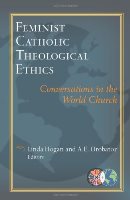Reviewed by Andrew J. Spencer
Contributors
Feminist Catholic Theological Ethics: Conversations in the World Church is a collection of twenty-three essays written by scholars from around the globe. The volume was co-edited by Linda F. Hogan, Professor of Ecumenics at Trinity College, Dublin, and A. E. Orobator, S.J., the provincial of the Eastern African Province of the Society of Jesus and lecturer at Hekima College Jesuit School of Theology in Nairobi, Kenya. The list of authors is extensive and it reflects an intentional selection of voices from all hemispheres, as well as scholars from nations of various degrees of economic development. Far from being a chorus of voices of feminist theologians of European descent, this volume reflects an admirable diversity, as the sub-title suggests.
Variety of Concerns
The volume does not contain any programmatic essays in feminist ethics; rather each essay picks up particular contextual concerns and examines them through a feminist lens. The purpose of the text is to demonstrate that “feminism is globally variegated, contextually multilayers, and methodologically polyglot” (1). This purpose is accomplished through consideration of issues as diverse as the ethics of dowry, the prevalence of Caucasian Mary icons in African contexts, and an analysis of cinematic presentations of female leadership in the Catholic Church. As one would expect, the issues discussed tend to emphasize the role of women in the Catholic Church and the place of women in societies with Catholic representation, even when the church is not a majority voice. Issues like Female Genital Mutilation (FGM) and the disproportionate spread of HIV/AIDS among African women are representative of the issues discusses from contexts in which the Catholic voice is a minority.
Female Leadership and the Catholic Church
The role of women in the leadership of the Catholic Church is a major issue that recurs through most of the essays in the volume. Some authors express a cautious optimism for the future of women in the Church, since the topic has been forced to be repeatedly addressed by Church leadership at various levels. In her concluding essay, Hogan explains that the feminist paradigm has shifted from critiquing themes of “ideologies of subordination that had become embedded in the [Catholic] tradition” to “reconstruct[ing] the tradition in a manner that is more consonant with the original egalitarian vision of Christianity” (280). In most cases, this reconstruction is proposed with an understanding of the equivalence of sex and gender, though Aloysius Lopes Cartagenas notes, “The fluidity of gender constitutes perhaps the most serious feminist provocation to clericalism to date” (93). Cartagenas even questions Jesus’ gender, since “while he had a male body, he negotiated, partially complied with, transgressed, or reconstructed the social, cultural, and religious codes of manhood/masculinity and womanhood/femininity expedient to every man and woman of his times” (93). Others, too, bring the idea of gender as a social construct into their arguments, though the digression from biblical categories was not universal.
Social Concerns
The authors in this volume raise many legitimate social concerns. For example, James Keenan’s essay on sexual abuse scandals is enlightening. He notes that in the Sandusky case, as well as the cases of sexual abuse within the Catholic Church, efforts to cover up such scandals have historically been made by all male cohorts. Women’s voices were central in raising public concerns in both the Sandusky scandal at Penn State and the earlier issues in the Boston Archdiocese. Keenan uses these cases to argue for the necessity of including women in decision making in the Church.
As another example, in Shaji Goeorge Kochuthara’s essay on the social evils of dowry in India illustrate several cases of physical abuse and even murder of women due to the traditional practice of dowry. The practice of dowry is illegal in India, though he notes it is often accepted or ignored, even by the local Catholic churches. Kochuthara argues against dowry because of the documented abuse that it causes, but also because he feels it contributes to “the continuing belief that a woman is inferior and a burden to the family” (116). Thus Keenan, Kochuthara, and many of the other essayists present important social concerns. However, instead of empowering unified social action among Christians, the feminist methodology in these essays tends to accentuate the theological tension for believers with a traditional understanding of gender roles.
Lines of Argument
The arguments in the essays are mainly made through evidential arguments that depend on uneven outcomes and assumptions about the way the Catholic Church and broader society ought to be structured. Notably absent from most of the essays, though not all, are references to the Scripture or church tradition. This method of argumentation will leave many readers questioning from what basis the ethical claims arise. In the pursuit of social justice, it is important that co-belligerents have a common vision for justice, which usually stems from a mutually accepted source. Ultimately, the ethical methodologies used by the authors may undermine a pursuit of commonly accepted social goals due to their desire to subvert traditional understandings of gender.
Assessment
This volume is helpful for understanding the spread of the feminist movement. No longer are Western feminists the only significant voices in the conversation; feminist theology has reached every quadrant of the globe, though the theological method has largely remained consistent. The essays in this volume demonstrate rather than develop the feminist theological methodology, so they do little to address previous critiques of feminist theology. Feminist Catholic Theological Ethics informs the reader of the current state and trajectory of the discipline, but it has little persuasive power for those outside the feminist tradition. As such, this volume is helpful in cataloging development of one particular version of contextual theology and should be read with that in mind.
Andrew J. Spencer is a PhD student studying Christian Ethics at Southeastern Baptist Theological Seminary in Wake Forest, NC.
